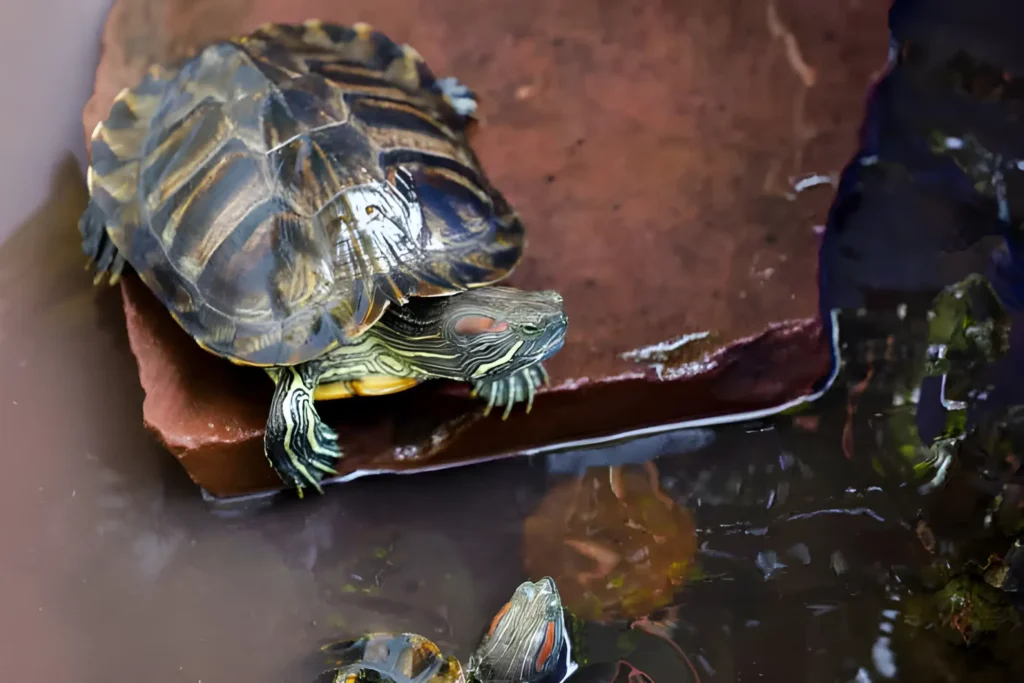Turtles rely on their vision for essential functions like foraging, identifying predators, and navigating their environment. Swollen eyes are a serious sign that something is amiss and could potentially lead to further health complications or even impaired vision if left untreated. It’s crucial to address this concern promptly and determine the root cause.
Understanding Swollen Turtle Eyes
Turtles have complex eyes adapted for both land and water vision. Swollen eyes are a clear sign something is wrong. You may notice:
- Puffiness: Eyes appear enlarged or bulging
- Closed or Partially Closed: Turtle struggles to open its eyes
- Discharge: Clear, white, yellow, or crusty substances may appear
- Redness: Eyelids or surrounding tissues look inflamed
What Causes Swollen Eyes in Turtles?
1. Vitamin A Imbalance: Turtles need sufficient Vitamin A to keep their eyes healthy. When levels are too low, the lining of the eye can become compromised, increasing vulnerability to swelling and infection. Diet adjustments or supplements might be needed under veterinary guidance.
2. Infections: Various bacteria, viruses, and even fungi can target a turtle’s eyes. Dirty water, weakened immune systems, or wounds make infection more likely. These infections often result in swelling, redness, discharge, and the potential for complications if untreated.
3. Injuries: Whether in the wild or in captivity, turtles can experience eye injuries from fights with tankmates, encounters with sharp objects, falls, and other accidents. These injuries cause immediate inflammation and swelling, and open the door for potential infection.
4. Lack of Fluids: If a turtle becomes dehydrated, either through insufficient water intake or illness, their eye tissues may suffer. This can manifest as sunken or irritated eyes, along with overall sluggishness.
5. Hidden Health Issues: Sometimes swollen eyes are a symptom of problems elsewhere in the body. Kidney problems, respiratory illnesses, and other systemic issues can occasionally lead to fluid buildup around the eyes, making a thorough veterinary diagnosis crucial.
What to Do When You Notice Swollen Eyes

- Observe and Isolate: Pay close attention to the severity of swelling, any accompanying symptoms, and if other turtles are affected. Isolation prevents the spread of potential infections.
- Offer First Aid: Safely and gently clean any discharge from the eyes with a damp cotton ball or sterilized saline. Be mindful not to put pressure on the eye itself.
- Examine the Habitat: Check water quality (filtration, ammonia, etc.), basking temperatures, diet, and for potential sources of injury. Rectifying any problems is a start, but won’t replace vet care.
- Seek Veterinary Treatment: A reptile vet is essential for diagnosing the cause. Treatment might involve antibiotic or antifungal medication, topical ointments, correcting husbandry issues, or addressing underlying disease.
Proactive Eye Health Habits
- Varied, Balanced Diet: Provide leafy greens, vegetables, commercial turtle food, and occasional protein balanced for your turtle’s species. A vet can advise on the right supplement if needed.
- Optimal Habitat: Species-specific research is key. Ensure proper water quality, UVB lighting, basking temperature, and humidity for your turtle.
- Protection from Injury: Outdoor pens should be secure, tank decor shouldn’t have sharp edges, and aggressive turtles must be housed separately.
- Regular Veterinary Checkups: Annual exams help catch subtle changes and allow for early treatment, protecting your turtle’s overall health and preventing more serious eye problems.
Conclusion
By being observant, providing excellent care, and seeking veterinary help when needed, you can ensure your turtle’s eyes stay healthy and bright. Prevention is the best medicine, but if concerns arise, swift and informed action is crucial for safeguarding your turtle’s eyesight and well-being.
I hope you find this article helpful and informative. If Yes’ feel free to share it with your friends!
Frequently Asked Question
Can swollen eyes lead to blindness?
Yes, if the cause is severe or not treated quickly, blindness is a possible outcome. This underscores the importance of urgent veterinary attention.
My turtle’s eyes are always a bit puffy. Is that normal?
Some puffiness while submerged may be normal for aquatic turtles. However, persistent swelling, redness, difficulty opening eyes, or any discharge warrants concern. Discuss this with your vet.
How do I know if my turtle’s eye issue is serious?
Consider these as red flags for urgent veterinary care:
Extreme swelling or eyes sealed shut
Thick, colored discharge (not clear)
Visible injury or changes in eye shape
Lethargy or lack of appetite alongside eye problems
How do you treat an eye infection in a box turtle?
Never attempt to treat an eye infection without veterinary diagnosis and instruction. Treatment may involve antibiotic or antifungal medications, sometimes in injectable form. Additionally, your vet will address husbandry concerns to prevent reinfection.
Can a turtle die from swollen eyes?
While swollen eyes themselves aren’t usually fatal, the underlying causes can be. Severe infections, dehydration, or systemic illnesses can become life-threatening complications if left untreated. This is why prompt veterinary care is essential.
Can I use human eye drops for my turtle?
Absolutely not! Human eye medications are formulated for our eyes and can be harmful or ineffective for turtles. Only use products specifically prescribed by your reptile vet.

